英国作家弗朗西斯·培根的《论读书》
- 格式:docx
- 大小:127.59 KB
- 文档页数:2
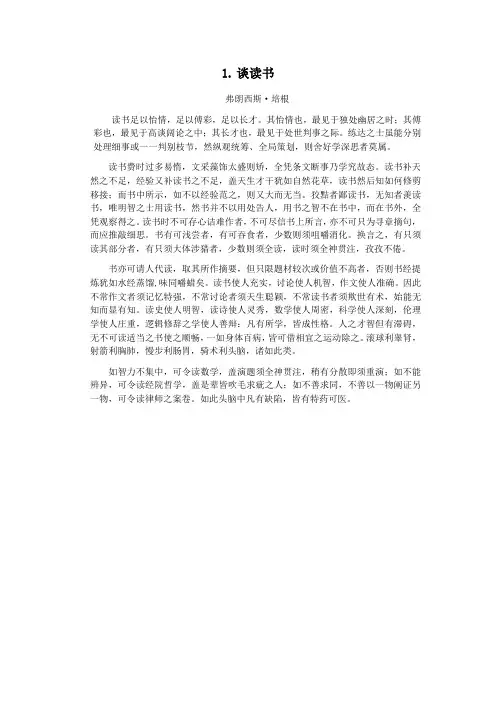
1.谈读书弗朗西斯·培根读书足以怡情,足以傅彩,足以长才。
其怡情也,最见于独处幽居之时;其傅彩也,最见于高谈阔论之中;其长才也,最见于处世判事之际。
练达之士虽能分别处理细事或一一判别枝节,然纵观统筹、全局策划,则舍好学深思者莫属。
读书费时过多易惰,文采藻饰太盛则矫,全凭条文断事乃学究故态。
读书补天然之不足,经验又补读书之不足,盖天生才干犹如自然花草,读书然后知如何修剪移接;而书中所示,如不以经验范之,则又大而无当。
狡黠者鄙读书,无知者羡读书,唯明智之士用读书,然书并不以用处告人,用书之智不在书中,而在书外,全凭观察得之。
读书时不可存心诘难作者,不可尽信书上所言,亦不可只为寻章摘句,而应推敲细思。
书有可浅尝者,有可吞食者,少数则须咀嚼消化。
换言之,有只须读其部分者,有只须大体涉猎者,少数则须全读,读时须全神贯注,孜孜不倦。
书亦可请人代读,取其所作摘要,但只限题材较次或价值不高者,否则书经提炼犹如水经蒸馏,味同嚼蜡矣。
读书使人充实,讨论使人机智,作文使人准确。
因此不常作文者须记忆特强,不常讨论者须天生聪颖,不常读书者须欺世有术,始能无知而显有知。
读史使人明智,读诗使人灵秀,数学使人周密,科学使人深刻,伦理学使人庄重,逻辑修辞之学使人善辩:凡有所学,皆成性格。
人之才智但有滞碍,无不可读适当之书使之顺畅,一如身体百病,皆可借相宜之运动除之。
滚球利睾肾,射箭利胸肺,慢步利肠胃,骑术利头脑,诸如此类。
如智力不集中,可令读数学,盖演题须全神贯注,稍有分散即须重演;如不能辨异,可令读经院哲学,盖是辈皆吹毛求疵之人;如不善求同,不善以一物阐证另一物,可令读律师之案卷。
如此头脑中凡有缺陷,皆有特药可医。
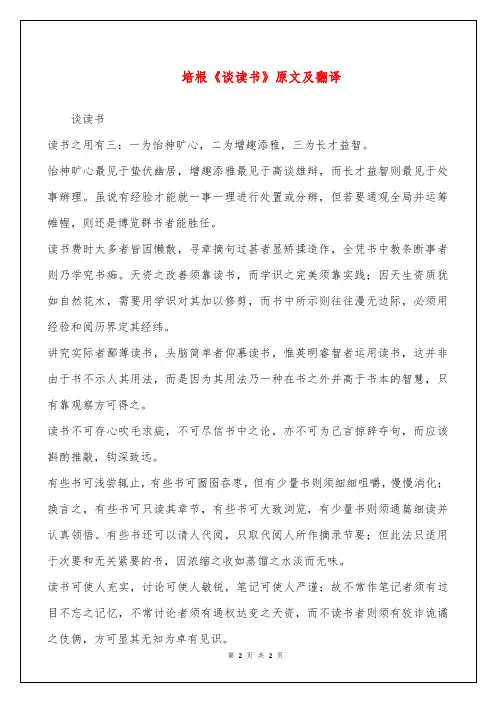
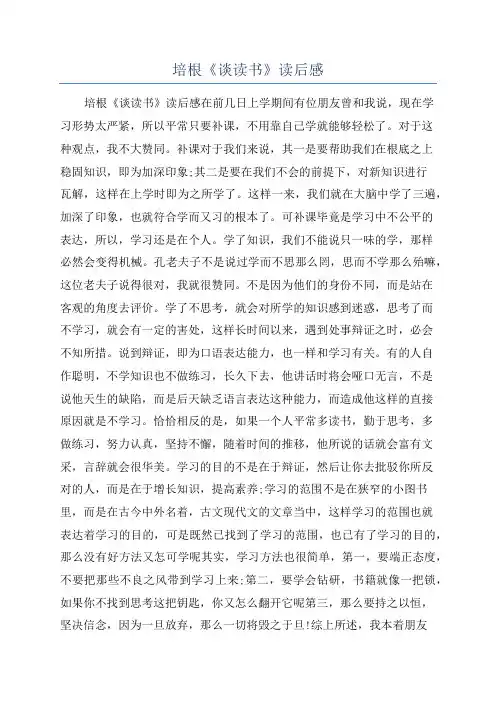
培根《谈读书》读后感培根《谈读书》读后感在前几日上学期间有位朋友曾和我说,现在学习形势太严紧,所以平常只要补课,不用靠自己学就能够轻松了。
对于这种观点,我不大赞同。
补课对于我们来说,其一是要帮助我们在根底之上稳固知识,即为加深印象;其二是要在我们不会的前提下,对新知识进行瓦解,这样在上学时即为之所学了。
这样一来,我们就在大脑中学了三遍,加深了印象,也就符合学而又习的根本了。
可补课毕竟是学习中不公平的表达,所以,学习还是在个人。
学了知识,我们不能说只一味的学,那样必然会变得机械。
孔老夫子不是说过学而不思那么罔,思而不学那么殆嘛,这位老夫子说得很对,我就很赞同。
不是因为他们的身份不同,而是站在客观的角度去评价。
学了不思考,就会对所学的知识感到迷惑,思考了而不学习,就会有一定的害处,这样长时间以来,遇到处事辩证之时,必会不知所措。
说到辩证,即为口语表达能力,也一样和学习有关。
有的人自作聪明,不学知识也不做练习,长久下去,他讲话时将会哑口无言,不是说他天生的缺陷,而是后天缺乏语言表达这种能力,而造成他这样的直接原因就是不学习。
恰恰相反的是,如果一个人平常多读书,勤于思考,多做练习,努力认真,坚持不懈,随着时间的推移,他所说的话就会富有文采,言辞就会很华美。
学习的目的不是在于辩证,然后让你去批驳你所反对的人,而是在于增长知识,提高素养;学习的范围不是在狭窄的小图书里,而是在古今中外名着,古文现代文的文章当中,这样学习的范围也就表达着学习的目的,可是既然已找到了学习的范围,也已有了学习的目的,那么没有好方法又怎可学呢其实,学习方法也很简单,第一,要端正态度,不要把那些不良之风带到学习上来;第二,要学会钻研,书籍就像一把锁,如果你不找到思考这把钥匙,你又怎么翻开它呢第三,那么要持之以恒,坚决信念,因为一旦放弃,那么一切将毁之于旦!综上所述,我本着朋友的身份告知天下的朋友,我们学习,不要只为了走捷径而偏弃了那些足以带给我们磨练的曲路!精选阅读谈读书读后感谈读书读后感范文一读书,我个人认为它有两层意思:第一,看书,看一本或一篇从未看过,也可以是重新看的书,第二,学习,上学校,多用于现代社会中,孩子出门前,都说一句:我读书去了!不想读书不爱读书的人如果有人问他为什么不读书〔指课外书〕,80%的孩子都会答复没时间,我想换成是我,也会那么说的。
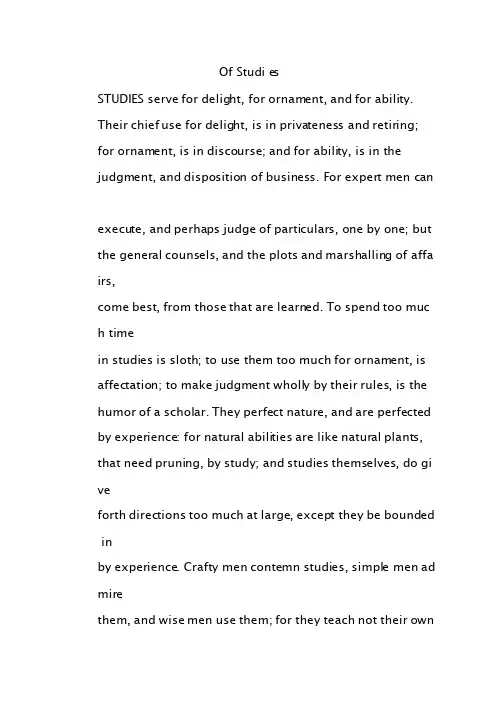
Of Studie sSTUDIE S servefor deligh t, for orname nt, and for abilit y. Theirchiefuse for deligh t, is in privat eness and retiri ng; for orname nt, is in discou rse; and for abilit y, is in the judgme nt, and dispos ition of busine ss. For expert men canexecut e, and perhap s judgeof partic ulars, one by one; but the genera l counse ls, and the plotsand marsha lling of affa ir s,come best, from thosethat are learne d. To spendtoo muc h timein studie s is sloth; to use them too much for orname nt, is affect ation; to make judgme nt wholly by theirrules, is the humorof a schola r. They perfec t nature, and are perfec ted by experi ence: for natura l abilit ies are like natura l plants, that need prunin g, by study; and studie s themse lves, do gi veforthdirect ionstoo much at large, except they be bounde d inby experi ence. Crafty men contem n studie s, simple men ad mirethem, and wise men use them; for they teachnot theirownbut that is a wisdom withou t them, and abovethem, won b yobserv ation. Read not to contra dictand confut e; nor to beli ev eand take for grante d; nor to find talk and discou rse; but to weighand consid er. Some booksare to be tasted, others t o beswallo wed, and some few to be chewed and digest ed; that i s,some booksare to be read only in parts; others to be read,but not curiou sly; and some few to be read wholly, and wit hdilige nce and attent ion. Some booksalso may be read by d eputy,and extrac ts made of them bother s; but that wouldbe only inthe less import ant argume nts, and the meaner sort of book s,else distil led booksare like common distil led waters, flashyReadin g make a full man; confer encea readyman; and writ in gan exactman. And theref ore, if a man writelittle, he had need have a greatmemory; if he confer little, he had need have a presen t wit: and if he read little, he had need have much cunnin g, to seem to know, that he doth not. Histor ie smake men wise; poetswitty; the mathem atics subtit le; nat ura lphilos ophydeep; moralgrave; logicand rhetor ic able to co nten d.Abeunt studia in mores. Nay, thereis no standor impedi m entinthe wit, but may be wrough t out by fit studie s; like as diseasesof the body, may have approp riate exerci ses. Bowlin g is go od forthe stoneand reins; shooti ng for the lungsand ***; gentle walkin g for the stomac h; riding for the head; and the like. Soif a man's wit be wander ing, let him studythe mathem atics ; forin demons trati ons, if his wit be called away neverso little, he must beginagain. If his wit be not apt to distin guish or find differ ences, let him studythe School men; for they are Cymini sector s. If he be not apt to beat over matter s, and tocall up one thingto proveand illust rateanothe r, let him st udythe lawyer s' cases. So everydefect of the mind, may have a specia l receip t.论读书王佐良译读书足以怡情,足以傅彩,足以长才。
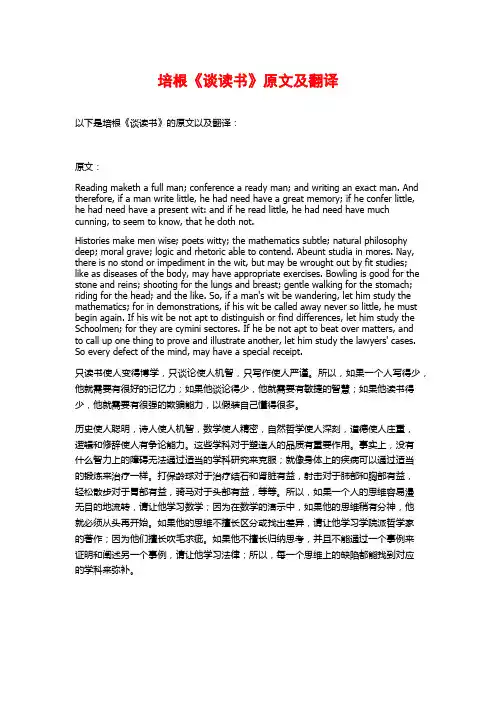
培根《谈读书》原文及翻译以下是培根《谈读书》的原文以及翻译:原文:Reading maketh a full man; conference a ready man; and writing an exact man. And therefore, if a man write little, he had need have a great memory; if he confer little, he had need have a present wit: and if he read little, he had need have much cunning, to seem to know, that he doth not.Histories make men wise; poets witty; the mathematics subtle; natural philosophy deep; moral grave; logic and rhetoric able to contend. Abeunt studia in mores. Nay, there is no stond or impediment in the wit, but may be wrought out by fit studies; like as diseases of the body, may have appropriate exercises. Bowling is good for the stone and reins; shooting for the lungs and breast; gentle walking for the stomach; riding for the head; and the like. So, if a man's wit be wandering, let him study the mathematics; for in demonstrations, if his wit be called away never so little, he must begin again. If his wit be not apt to distinguish or find differences, let him study the Schoolmen; for they are cymini sectores. If he be not apt to beat over matters, andto call up one thing to prove and illustrate another, let him study the lawyers' cases. So every defect of the mind, may have a special receipt.只读书使人变得博学,只谈论使人机智,只写作使人严谨。
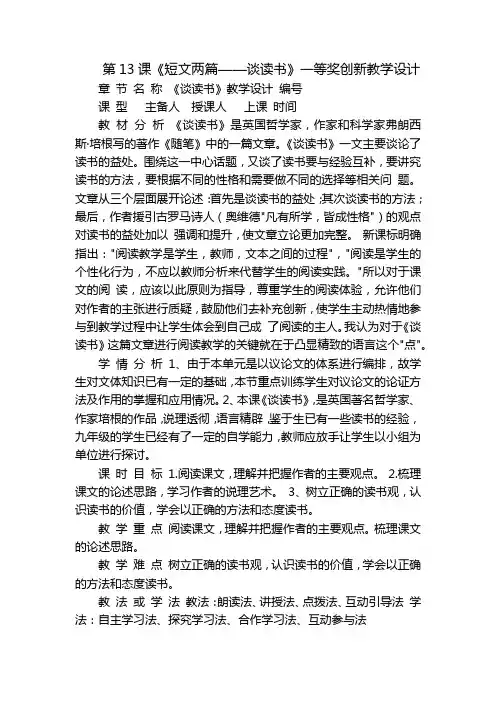
第13课《短文两篇——谈读书》一等奖创新教学设计章节名称《谈读书》教学设计编号课型主备人授课人上课时间教材分析《谈读书》是英国哲学家,作家和科学家弗朗西斯·培根写的著作《随笔》中的一篇文章。
《谈读书》一文主要谈论了读书的益处。
围绕这一中心话题,又谈了读书要与经验互补,要讲究读书的方法,要根据不同的性格和需要做不同的选择等相关问题。
文章从三个层面展开论述:首先是谈读书的益处;其次谈读书的方法;最后,作者援引古罗马诗人(奥维德"凡有所学,皆成性格")的观点对读书的益处加以强调和提升,使文章立论更加完整。
新课标明确指出:"阅读教学是学生,教师,文本之间的过程","阅读是学生的个性化行为,不应以教师分析来代替学生的阅读实践。
"所以对于课文的阅读,应该以此原则为指导,尊重学生的阅读体验,允许他们对作者的主张进行质疑,鼓励他们去补充创新,使学生主动热情地参与到教学过程中让学生体会到自己成了阅读的主人。
我认为对于《谈读书》这篇文章进行阅读教学的关键就在于凸显精致的语言这个"点"。
学情分析1、由于本单元是以议论文的体系进行编排,故学生对文体知识已有一定的基础,本节重点训练学生对议论文的论证方法及作用的掌握和应用情况。
2、本课《谈读书》,是英国著名哲学家、作家培根的作品,说理透彻,语言精辟,鉴于生已有一些读书的经验,九年级的学生已经有了一定的自学能力,教师应放手让学生以小组为单位进行探讨。
课时目标1.阅读课文,理解并把握作者的主要观点。
2.梳理课文的论述思路,学习作者的说理艺术。
3、树立正确的读书观,认识读书的价值,学会以正确的方法和态度读书。
教学重点阅读课文,理解并把握作者的主要观点。
梳理课文的论述思路。
教学难点树立正确的读书观,认识读书的价值,学会以正确的方法和态度读书。
教法或学法教法:朗读法、讲授法、点拨法、互动引导法学法:自主学习法、探究学习法、合作学习法、互动参与法教学媒体选择分析媒体类型媒体内容要点教学作用使用方式所得结论占用时间媒体来源文字字词A E 读准词语,解释意思4 自制文字整体感知课文G F 梳理课文的论述思路7 自制文字多角度说理G B 学习作者的说理艺术。

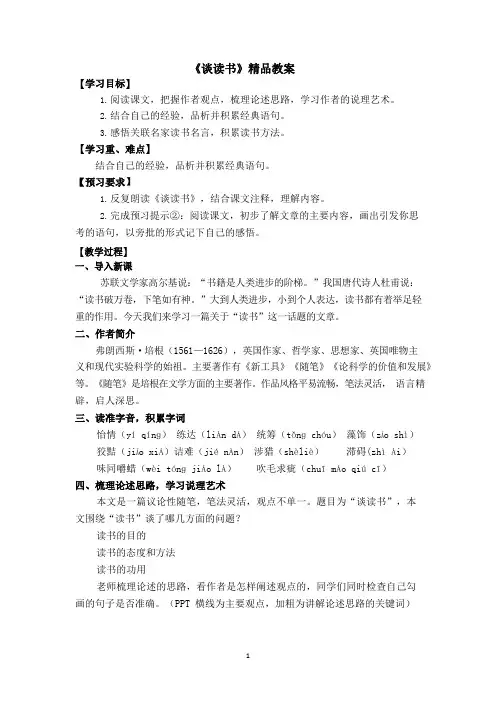
《谈读书》精品教案【学习目标】1.阅读课文,把握作者观点,梳理论述思路,学习作者的说理艺术。
2.结合自己的经验,品析并积累经典语句。
3.感悟关联名家读书名言,积累读书方法。
【学习重、难点】结合自己的经验,品析并积累经典语句。
【预习要求】1.反复朗读《谈读书》,结合课文注释,理解内容。
2.完成预习提示②:阅读课文,初步了解文章的主要内容,画出引发你思考的语句,以旁批的形式记下自己的感悟。
【教学过程】一、导入新课苏联文学家高尔基说:“书籍是人类进步的阶梯。
”我国唐代诗人杜甫说:“读书破万卷,下笔如有神。
”大到人类进步,小到个人表达,读书都有着举足轻重的作用。
今天我们来学习一篇关于“读书”这一话题的文章。
二、作者简介弗朗西斯·培根(1561—1626),英国作家、哲学家、思想家、英国唯物主义和现代实验科学的始祖。
主要著作有《新工具》《随笔》《论科学的价值和发展》等。
《随笔》是培根在文学方面的主要著作。
作品风格平易流畅,笔法灵活,语言精辟,启人深思。
三、读准字音,积累字词怡情(yí qínɡ)练达(liÀn dÁ)统筹(tǒnɡ chóu)藻饰(zǍo shì)狡黠(jiǍo xiÁ)诘难(jié nÀn)涉猎(shèliè)滞碍(zhì Ài)味同嚼蜡(wèi tónɡ jiÁo lÀ)吹毛求疵(chuī mÁo qiú cī)四、梳理论述思路,学习说理艺术本文是一篇议论性随笔,笔法灵活,观点不单一。
题目为“谈读书”,本文围绕“读书”谈了哪几方面的问题?读书的目的读书的态度和方法读书的功用老师梳理论述的思路,看作者是怎样阐述观点的,同学们同时检查自己勾画的句子是否准确。
(PPT 横线为主要观点,加粗为讲解论述思路的关键词)读书足以怡情,足以傅彩,足以长才。
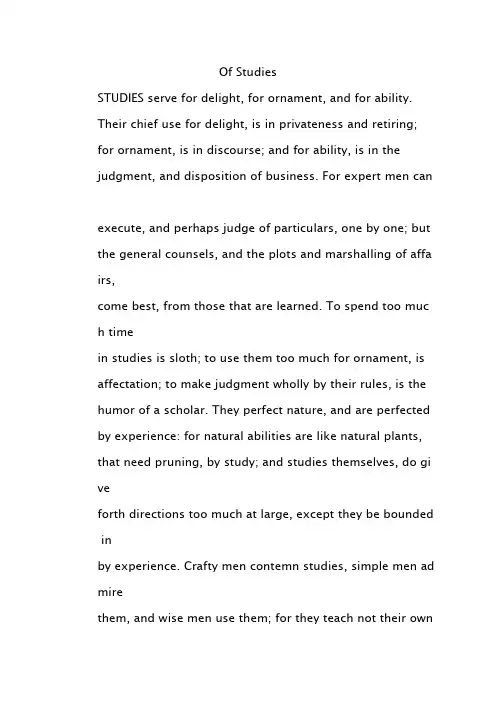
Of StudiesSTUDIES serve for delight, for ornament, and for ability. Their chief use for delight, is in privateness and retiring; for ornament, is in discourse; and for ability, is in the judgment, and disposition of business. For expert men canexecute, and perhaps judge of particulars, one by one; but the general counsels, and the plots and marshalling of affa irs,come best, from those that are learned. To spend too muc h timein studies is sloth; to use them too much for ornament, is affectation; to make judgment wholly by their rules, is the humor of a scholar. They perfect nature, and are perfected by experience: for natural abilities are like natural plants, that need pruning, by study; and studies themselves, do gi veforth directions too much at large, except they be bounded inby experience. Crafty men contemn studies, simple men ad mirethem, and wise men use them; for they teach not their ownbut that is a wisdom without them, and above them, won b yobservation. Read not to contradict and confute; nor to beli eveand take for granted; nor to find talk and discourse; but to weigh and consider. Some books are to be tasted, others t o beswallowed, and some few to be chewed and digested; that i s,some books are to be read only in parts; others to be read,but not curiously; and some few to be read wholly, and wit hdiligence and attention. Some books also may be read by d eputy,and extracts made of them bothers; but that would be only inthe less important arguments, and the meaner sort of book s,else distilled books are like common distilled waters, flashyReading make a full man; conference a ready man; and writ ingan exact man. And therefore, if a man write little, he had need have a great memory; if he confer little, he had need have a present wit: and if he read little, he had need have much cunning, to seem to know, that he doth not. Historie smake men wise; poets witty; the mathematics subtitle; nat uralphilosophy deep; moral grave; logic and rhetoric able to co ntend.Abeunt studia in mores. Nay, there is no stand or impedim ent inthe wit, but may be wrought out by fit studies; like as disea sesof the body, may have appropriate exercises. Bowling is go od forthe stone and reins; shooting for the lungs and ***; gentle walking for the stomach; riding for the head; and the like. Soif a man's wit be wandering, let him study the mathematics ; forin demonstrations, if his wit be called away never so little, he must begin again. If his wit be not apt to distinguish or find differences, let him study the Schoolmen; for they are Cymini sectors. If he be not apt to beat over matters, and t ocall up one thing to prove and illustrate another, let him st udythe lawyers' cases. So every defect of the mind, may have a special receipt.论读书王佐良译读书足以怡情,足以傅彩,足以长才。
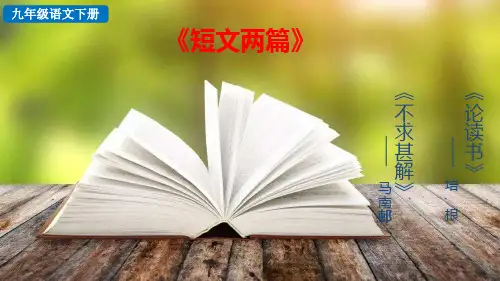
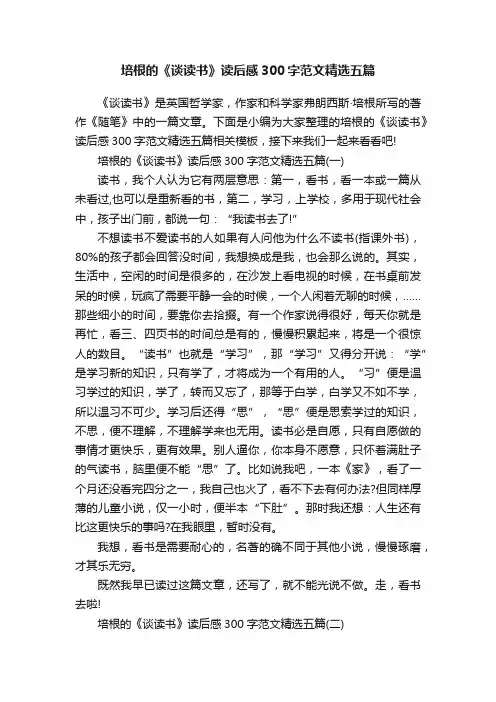
培根的《谈读书》读后感300字范文精选五篇《谈读书》是英国哲学家,作家和科学家弗朗西斯·培根所写的著作《随笔》中的一篇文章。
下面是小编为大家整理的培根的《谈读书》读后感300字范文精选五篇相关模板,接下来我们一起来看看吧!培根的《谈读书》读后感300字范文精选五篇(一)读书,我个人认为它有两层意思:第一,看书,看一本或一篇从未看过,也可以是重新看的书,第二,学习,上学校,多用于现代社会中,孩子出门前,都说一句:“我读书去了!”不想读书不爱读书的人如果有人问他为什么不读书(指课外书),80%的孩子都会回答没时间,我想换成是我,也会那么说的。
其实,生活中,空闲的时间是很多的,在沙发上看电视的时候,在书桌前发呆的时候,玩疯了需要平静一会的时候,一个人闲着无聊的时候,……那些细小的时间,要靠你去拾掇。
有一个作家说得很好,每天你就是再忙,看三、四页书的时间总是有的,慢慢积累起来,将是一个很惊人的数目。
“读书”也就是“学习”,那“学习”又得分开说:“学”是学习新的知识,只有学了,才将成为一个有用的人。
“习”便是温习学过的知识,学了,转而又忘了,那等于白学,白学又不如不学,所以温习不可少。
学习后还得“思”,“思”便是思索学过的知识,不思,便不理解,不理解学来也无用。
读书必是自愿,只有自愿做的事情才更快乐,更有效果。
别人逼你,你本身不愿意,只怀着满肚子的气读书,脑里便不能“思”了。
比如说我吧,一本《家》,看了一个月还没看完四分之一,我自己也火了,看不下去有何办法?但同样厚薄的儿童小说,仅一小时,便半本“下肚”。
那时我还想:人生还有比这更快乐的事吗?在我眼里,暂时没有。
我想,看书是需要耐心的,名著的确不同于其他小说,慢慢琢磨,才其乐无穷。
既然我早已读过这篇文章,还写了,就不能光说不做。
走,看书去啦!培根的《谈读书》读后感300字范文精选五篇(二)在《培根随笔集》这本书语言简洁,短短的一小篇就可以让人受益匪浅,最适合我这种不喜欢读长篇大论而又想得到多点东西的人看了。
论《谈读书》一文的写作特色作者:陈晓红花拉来源:《语文建设·下旬》2018年第08期英国的文学家弗朗西斯·培根在1597年出版了一部《随笔集》,其中收录十篇短文,之后又扩充了两次,最终收录了五十八篇短文。
这些文章文字较少,篇幅很短,而且文意也不难理解,语句节奏感很强,而且文中有很多格言警句。
在这五十八篇短文中,既有叙事也有议论。
很多都是从一个人或者一件事情出发,由此引申,带出一个社会共性的问题,或者大部分人都比较关心的话题。
作者在此基础之上进一步展开,最终可以找到解决问题的办法,整个过程带给读者启迪。
培根的文章之所以会表现这些特点,与当时历史背景是分不开的。
文艺复兴运动正如火如荼进行,人文主义打破神学统治地位,从而赋予人更多的自由和权利,很多人文主义者希望人能够变得更加完美。
为了救治人身上的弊病,所以当时的很多文章都带有教诲的意味。
这类文章论述非常精辟,而且蕴含了丰富的哲理,而培根正是最早写作这类文章的,因而被后世称为“不仅开英国散文之先河,而且堪称后世散文大家之楷模”。
《谈读书》是《随笔录》中的一篇,虽然篇幅短小,但富含深刻的意义,把读书的方法和好处都阐述得非常透彻。
文章中用到了很多庄重而又典雅的词语,在用词方面非常讲究,而且句子的节奏感很强,蕴含哲理,所以读起来非常顺畅。
句式上更多是采用并列句式,使得句子的语言和语意更为平衡。
作者非常善于用排比和比喻的修辞,而且在说明道理的时候深入浅出,除了连接词以外,基本都是名言警句,文意简洁但非常有说服力。
加强对文章写作特色的分析,对理解作者的思想非常有帮助,下文从词语、句式以及修辞等方面来分析。
一、词语分析《谈读书》一文中用到了很多古语词,使得语言显得典雅而又庄重,给人厚重感。
作者在选词的时候,多用词义非常明确的词语,没有选用一些谦逊或者模棱两可的词语。
除此之外,文中用到的某些词语的词义乃至语法在今天已经发生了变化,这些词语的使用也为这篇文章打上特定历史时期的烙印。
《论读书》翻译赏析班级:姓名:学号:Of Studiesby Francis BaconStudies serve for delight, for ornament, and for ability. Their chief use for delight is in privateness and retiring; for ornament, is in discourse; and for ability, is in the judgment and disposition of business. For expert men can execute, and perhaps judge of particulars, one by one; but the general counsels, and the plots and marshalling of affairs, come best, from those that are learned. To spend too much time in studies is sloth; to use them too much for ornament is affectation; to make judgment wholly by their rules, is the humor of a scholar. T hey perfect nature, and are perfected by experience: for natural abilities are like natural plants, that need pruning, by study; and studies themselves, do give forth directions too much at large, except they be bounded in by experience. Crafty men contemn studies, simple men admire them, and wise men use them; for they teach not their own use; but that is a wisdom without them, and above them, won by observation. Read not to contradict and confute; nor to believe and take for granted; nor to find talk and discourse; but to weigh and consider. Some books are to be tasted, others to be swallowed, and some few to be chewed and digested; that is, some books are to be read only in parts; others to be read, but not curiously; and some few to be read wholly, and with diligence and attention. Some books also may be read by deputy, and extracts made of them bothers; but that would be only in the less important arguments and the meaner sort of books, else distilled books are like common distilled waters, flashy things.Reading makes a full man; conference a ready man; and writing an exact man. And therefore, if a man write little, he had need have a great memory; if he confer little, he had need have a present wit: and if he read little, he had need have much cunning, to seem to know, that he doth not. Histories make men wise; poets witty; the mathematics subtitle; natural philosophy deep; moral grave; logic and rhetoric able tocontend. Abeunt studia in mores.Nay, there is no stand or impediment in the wit, but may be wrought out by fit studies; like as diseases of the body, may have appropriate exercises. Bowling is good for the stone and reins; shooting for the lungs and breast; gentle walking for the stomach; riding for the head; and the like. So if a man's wit be wandering, let him study the mathematics; for in demonstrations, if his wit be called away never so little, he must begin again. If his wit be not apt to distinguish or find differences, let him study the Schoolmen; for they are cymini sectors. If he be not apt to beat over matters, and to call up one thing to prove and illustrate another, let him study the lawyers' cases. So every defect of the mind may have a special receipt.《论读书》弗朗西斯·培根王佐良译读书足以怡情, 足以博采, 足以长才。
《论读书》王佐良、孙有中译本对比分析作者:王兰来源:《北方文学》2019年第06期摘要:英国文坛巨匠弗朗西斯·培根的《论读书》堪称经典之作,而译界前辈王佐良先生的翻译之作堪称经典中的经典。
但其实目前《论读书》的译本已经达到10种。
今天笔者将选取王佐良先生和孙有中教授的两个译本从选词用词、形合意合层面等方面进行简要评析。
关键词:《论读书》;译本;评析一、作者及原文介绍弗朗西斯·培根(Francis Bacon),英国散文家、哲学家,他以哲学眼光,铸就了许多不朽的文学作品。
Of Studies 是《培根随笔》中著名的一篇。
其语言因大量特色词汇以及句法,使整篇文章彰显出古雅的色彩。
比如说nay等词语,及在动词第三人称单数加th,had。
这些词汇语法的使用使得原文的语言更显庄重、得体。
原文中出现了八处虚拟语气句型,十一处被动语态。
在修辞上,排比并列句的使用,不仅使得原文形式工整,也突出了重点,增强语言气势和语音美感,读起来朗朗上口。
最后,纵观整篇文章,原文主题鲜明,层次清楚,逻辑严密。
二、译者介绍王佐良(1916~1995),翻译家,诗人。
把英诗多种题材译为中文,主张以诗译诗,存原诗风貌;孙中有,教育部外国语言文学类专业教学指导委员会秘书长,其翻译著作颇多。
三、译文分析(一)选词用词层面在前文中提及,本文属于规劝式文本,全文从未出现过I,we,you,通过这样开头的方式,作者拉开了作者与读者之间的区别。
那下面,就从译文的选词用词这一层面分析两个译本。
1.名词“英语表述中常用名词,故而有静态之说;汉语善用动词,呈动态”(1)。
英语文章中,在较为正式的文体中则多见名词,例如本文;而汉语常使用动词来表达作者情感,并且汉语的动词无需考虑时态及人称变化等问题。
王译本中分别用“怡情”、“傅彩”、“长才”三个动词取代了原文中“delight,ornament,ability”的三个名词,动词化的翻译不仅贴近读者,又忠实于原文的文雅用词。
英国作家弗朗西斯·培根的《论读书》一文:
Studies serve for delight, for ornament, and for ability. Their chief use for delight, is in privateness and retiring; for ornament, is in discourse; and for ability, is in the judgment, and disposition of business. For expert men can execute, and perhaps judge of particulars, one by one; but the general counsels, and the plots and marshalling of affairs, come best, from those that are learned.
To spend too much time in studies is sloth; to use them too much for ornament, is affectation; to make judgment wholly by their rules, is the humor of a scholar. They perfect nature, and are perfected by experience: for natural abilities are like natural plants, that need proyning, by study; and studies themselves, do give forth directions too much at large, except they be bounded in by experience.
Crafty men contemn studies, simple men admire them, and wise men use them; for they teach not their own use; but that is a wisdom without them, and above them, won by observation. Read not to contradict and confute; nor to believe and take for granted; nor to find talk and discourse; but to weigh and consider.
Some books are to be tasted, others to be swallowed, and some few to be chewed and digested; that is, some books are to be read only in parts; others to be read, but not curiously; and some few to be read wholly, and with diligence and attention. Some books also may be read by deputy, and extracts made of them by others; but that would be only in the less important arguments, and the meaner sort of books, else distilled books are like common distilled waters, flashy things.
Reading maketh a full man; conference a ready man; and writing an exact man. And therefore, if a man write little, he had need have a great memory; if he confer little, he had need have a present wit: and if he read little, he had need have much cunning, to seem to know, that he doth not.
Histories make men wise; poets witty; the mathematics subtile; natural philosophy deep; moral grave; logic and rhetoric able to contend. Abeunt studia in mores. Nay, there is no stond or impediment in the wit, but may be wrought out by fit studies; like as diseases of the body, may have appropriate exercises. Bowling is good for the stone and reins; shooting for the lungs and breast; gentle walking for the stomach; riding for the head; and the like.
So if a man's wit be wandering, let him study the mathematics; for in demonstrations, if his wit be called away never so little, he must begin again. If his wit be not apt to distinguish or find differences, let him study the Schoolmen; for they are cymini sectores. If he be not apt to beat over matters, and to call up one thing to prove and illustrate another, let him study the lawyers' cases. So every defect of the mind, may have a special receipt.
北京外国语大学王佐良教授的译文则更是字字珠玑,令人每读成颂,每颂
不舍。
读书足以怡情,足以傅彩,足以长才。
其怡情也,最见于独处幽居之时;
其傅彩也,最见于高谈阔论之中;其长才也,最见于处世判事之际。
练达之士虽能分别处理细事或一一判别枝节,然纵观统筹,全局策划,则
舍好学深思者莫属。
读书费时过多易惰,文采藻饰太盛则矫,全凭条文断事乃
学究故态。
读书补天然之不足,经验又补读书之不足,盖天生才干犹如自然花草,读
书然后知如何修剪移接,而书中所示,如不以经验范之,则又大而无当。
有一技之长者鄙读书,无知者羡读书,唯明智之士用读书,然书并不以用
处告人,用书之智不在书中,而在书外,全凭观察得之。
读书时不可存心诘难读者,不可尽信书上所言,亦不可只为寻章摘句,而
应推敲细思。
书有可浅尝者,有可吞食者,少数则须咀嚼消化。
换言之,有只需读其部
分者,有只须大体涉猎者,少数则须全读,读时须全神贯注,孜孜不倦。
书亦
可请人代读,取其所作摘要,但只限题材较次或价值不高者,否则书经提炼犹
如水经蒸馏,淡而无味。
读书使人充实,讨论使人机智,笔记使人准确。
因此不常做笔记者须记忆
力特强,不常讨论者须天生聪颖,不常读书者须欺世有术,始能无知而显有知。
读史使人明智,读诗使人灵秀,数学使人周密,科学使人深刻,伦理学使
人庄重,逻辑修辞之学使人善辩;凡有所学,皆成性格。
人之才智但有滞碍,无不可读适当之书使之顺畅,一如身体百病,皆可借
相宜之运动除之。
滚球利睾肾,射箭利胸肺,慢步利肠胃,骑术利头脑,诸如
此类。
如智力不集中,可令读数学,盖演题需全神贯注,稍有分散即须重演;
如不能辩异,可令读经院哲学,盖是辈皆吹毛求疵之人;如不善求同,不善以
一物阐证另一物,可令读律师之案卷。
如此头脑中凡有缺陷,皆有特效可医。